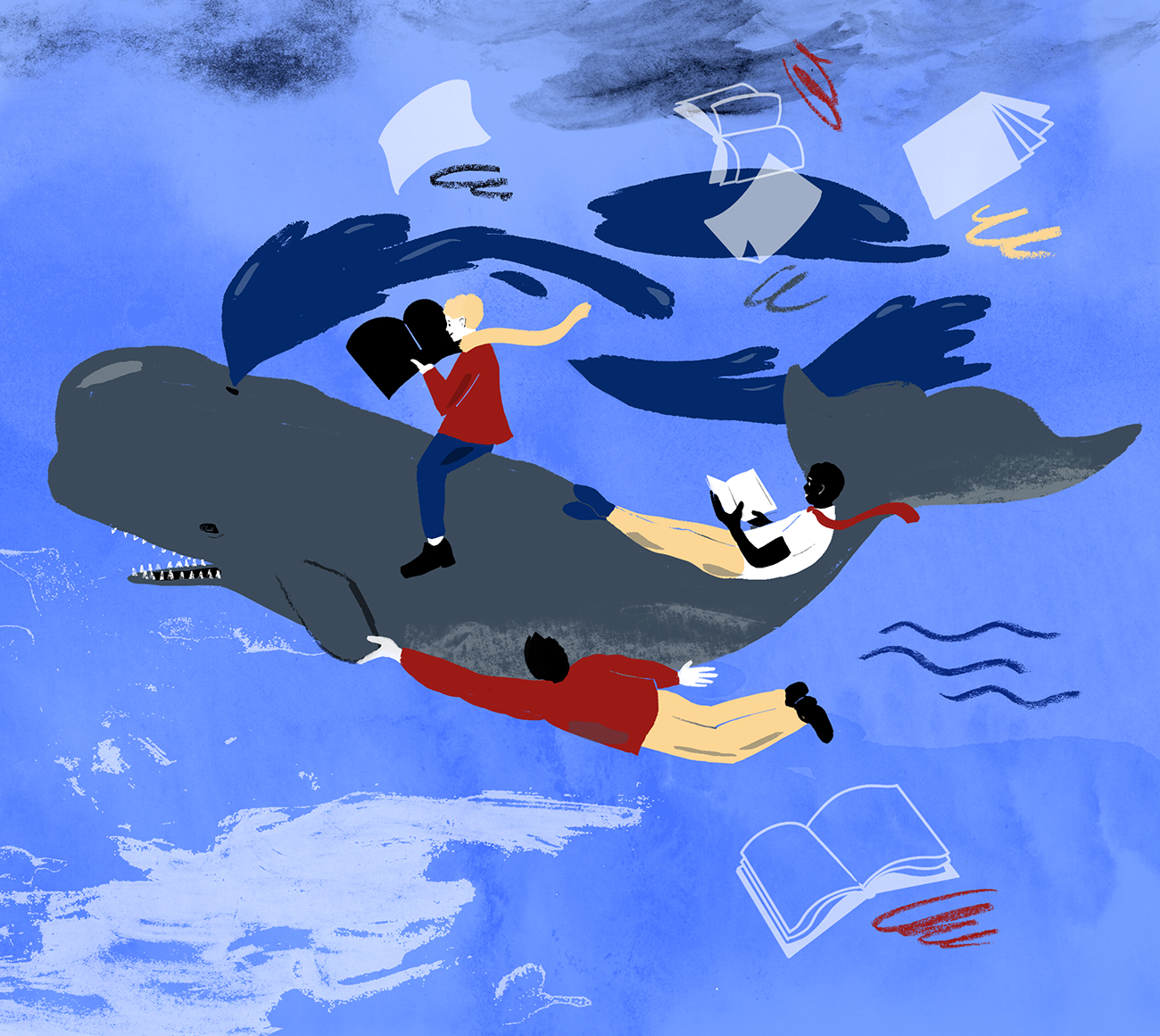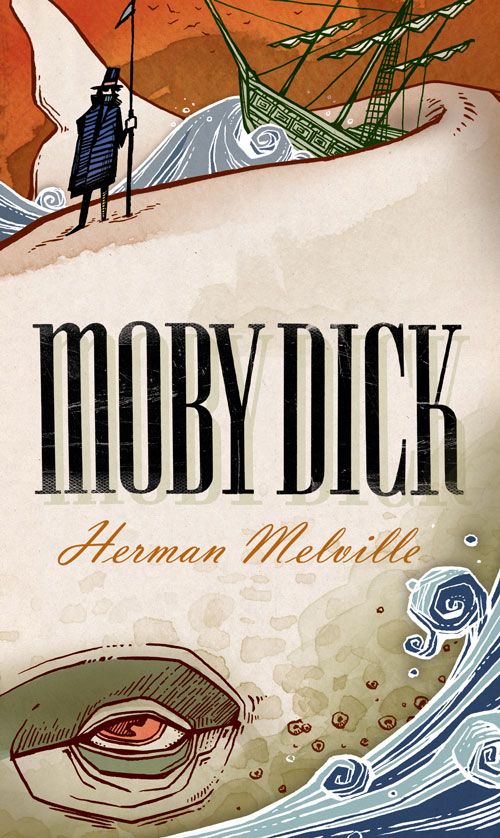
I never read Moby-Dick in a course at Amherst, but in my January Interterm in 1975 I devoured the outlandish yarn voraciously.
I was in a hurry because I was hungry. I’d hoped to study math or philosophy, but found myself somehow three months behind after only three weeks of those classes. English was worse. After a single semester of college, I was living in fear for my intellectual life.
It was a truth universally acknowledged, among us freshmen (we were all boys in those days), that our professors expected that we previously had read all the great works of literature, history, science and philosophy. Also, that all the other boys already had. I might come up with something to say about, for example, Andrew Marvell, but how could I ever catch up with everything I was expected to know already about Cavaliers and Roundheads, Latin verse and metaphysics, before I even started?
It was a universal truth and also, of course, an absolute falsehood. My dismay that I had “bitten off way more than I could chew” was widespread, as I learned years later, talking honestly about Amherst with other “old boys,” and, eventually, with women. None of us had world enough, or time.
A foolish freshman, I decided, in the month of January, to remedy a lifelong academic deficiency by reading a famous fat novel. Moby-Dick was an inspired choice, a cliché I use on purpose. Moby-Dick resuscitated my academic life.
You know the story—or at least, dear Amherst Reader, you know that you should. I majored in German, and I have read it four times. I later married an English professor, so I also am not unaware of the manifold meanings of Moby-Dick: an allegory of imperialism, environmentalism, racial injustice, neo-Platonism, nascent globalism or finance capitalism. (I like the speculation that the white whale represents the Second Bank of the United States.)

Moby-Dick (1851)
By Herman Melville
Originally read: January Interterm, 1975
This novel is ridiculously capacious. Whatever it means, the meaning of Moby-Dick cannot be disassociated from the work itself. To know it whole, you need to know it in every part.
The structure—the bones—of Moby-Dick didn’t tell this truth but showed it. To “get” Ahab’s obsession with the Leviathan, you had to ingest a trigonometric analysis of his skull; an etymology of the word whale; its representations in print, paint and poetry; and a great variety of other information, written in sundry styles. There are moments in a bewildering life when one thinks, “Yes, this must be how Herman Melville felt while writing Moby-Dick!” (At such times I recommend a lie-down, a cool drink and a quiet chat with a friend.)
But Melville responds to this psychedelic expansion of consciousness without angst and with a seriously dry wit: “There are certain queer times and occasions in this strange mixed affair we call life when a man takes this whole universe for a vast practical joke, though the wit thereof he but dimly discerns, and more than suspects that the joke is at nobody’s expense but his own.”
In a 1957 letter, bluesman and novelist Ralph Ellison wrote to a friend that he had been “rereading Moby-Dick again and appreciating for the first time what a truly good time Melville was having when he wrote it. Some of it is quite funny and all of it is pervaded by the spirit of play, like real jazz sounds when a master is manipulating it. The thing’s full of riffs, man; no wonder the book wasn’t understood in its own time.”
In 1851, the year it was published, even reviewers who didn’t like Moby-Dick sometimes declaimed its virtues innocently: it is “wantonly eccentric ... outrageously bombastic.” That’s what Moby-Dick inspired! Maybe I had no idea what I was doing at Amherst College in the first place, but from now on, if nothing else, my education would be wantonly eccentric. I would sample every art and science on the table. Even the scraps.
On this errand, I was ably accompanied by my companions at the table in the spacious new annex of Valentine Hall, boys who were studying subjects that I was not.
After supper most evenings that January, we might be discussing Spengler’s Decline of the West, or Sociobiology—the book by Edward Wilson or the new science behind it. Ways of Seeing and Triste Tropiques. The love lives of the fruit flies or the erotic hendecasyllabics of Catullus. The Peace of Westphalia or the films of Luis Buñuel. The inexorable laws of supply and demand, and Marxist, Whig or Hegelian laws of history. I had never heard of any of this, but I listened carefully, as interested in what the other boys were learning as I was in my classes. I didn’t acquire many marketable skills but sure improved my stock of metaphors.
(I wish I had thanked Robert C. Follette Jr., who was the public face of Valentine, before his death on Feb. 12, 2019. “Sweet Bob” contributed more to our Bildung than he ever knew. Thank you.)
That spring, Bill Pritchard ’53, who was trying to teach a course called “Modern Poetry”—a thankless task, as we knew nothing of ancient, pre-modern, early modern or any other sort of poetry—required that we read The Collected Prose of Robert Frost. That included an essay first published in this magazine. It’s called “Education by Poetry.” It’s short and strong and was a revelation. Education by poetry is education by metaphor. Now neuroscience has shown that all knowledge is metaphorical, but Frost knew already:
All metaphor breaks down somewhere. That is the beauty of it. It is touch and go with the metaphor, and until you have lived with it long enough you don’t know when it is going. You don’t know how much you can get out of it, and when it will cease to yield. It is a very living thing. It is as life itself.
Somehow—it was always touch-and-go—I survived Amherst College. Moby-Dick is also a tale of survival: in the end “all collapsed, and the great shroud of the sea rolled on as it rolled five thousand years ago.”
The subsequent coda is from Job: “And I only am escaped to tell thee.” Call me outcast, but I lived to tell
the tale.
Ishmael humble-brags, “A whale-ship was my Yale College and my Harvard.” My whale-ship was Amherst College. The metaphor isn’t mixed, just topsy-turvy.
W.S. Merwin once suggested something about Greek and Latin that seems true (metaphorically) of all learning, in “Learning a Dead Language”:
... To understand
The least thing fully you would have to perceive
The whole grammar in all its accidence
And all its system, in the perfect singleness
Of intention it has because it is dead.
You can only learn a part at a time.
I learned, from Ishmael, outcast and omniscient; from Frost, white-haired and ineffable; and viscerally, from my motley crew of messmates: In order to know anything, you have to know everything. Is that arrogance or humility?
Statt is a retiring communications consultant and a working writer and poet in Philadelphia.
Illustration by Barbara Ott